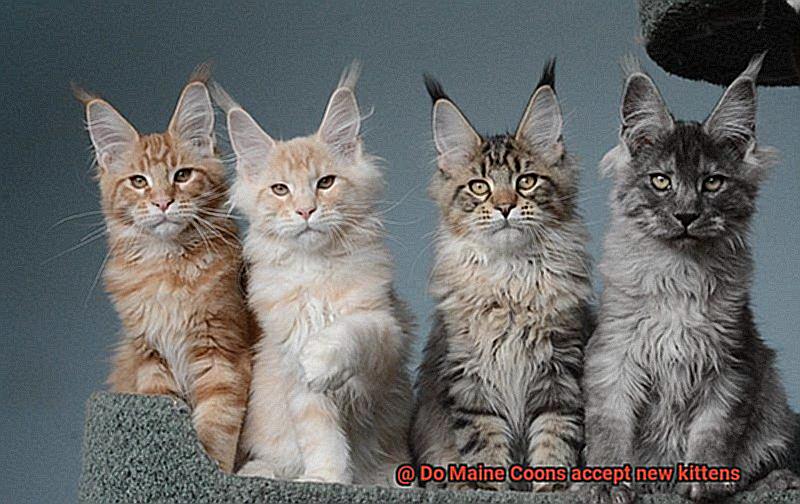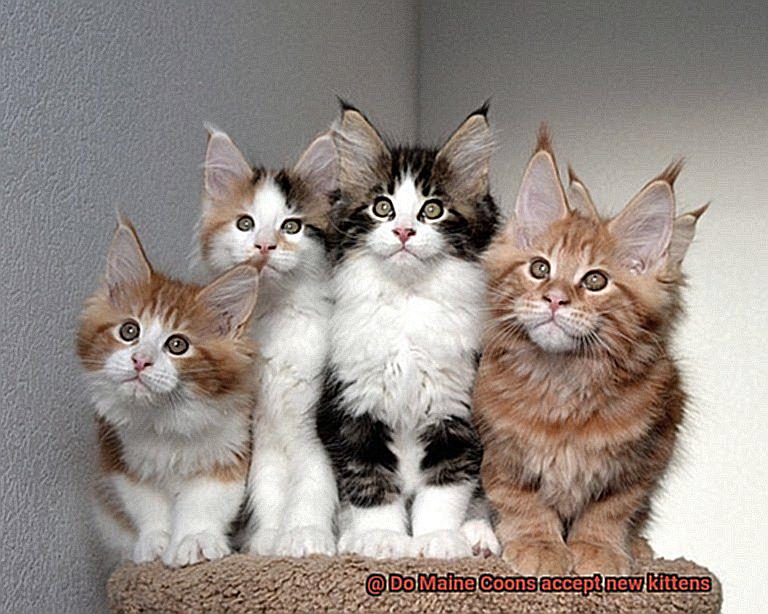Do you have the privilege of owning a magnificent Maine Coon and are thinking of expanding your furry family? Have you been pondering whether or not your Maine Coon would welcome a new kitten with open paws, or if it would turn into a feline feud? Don’t fret, as we’re here to help answer the question: do Maine Coons accept new kittens?
Before we delve deeper, let’s talk about the Maine Coon breed. These gentle giants are known for their affectionate nature, playful personality, and their love for their human families. They’re also highly adaptable to new situations, making them great with children and other pets. However, introducing a new kitten to your Maine Coon’s territory can be a sensitive matter that requires careful consideration.
In this blog post, we’ll cover everything you need to know about introducing a new kitten to your Maine Coon. We’ll explore the behavior of Maine Coons with other pets, the importance of gradual introductions, and the signs that indicate your Maine Coon is embracing the new addition to the family.
So if you’re contemplating adding a furry little friend to your Maine Coon’s life, read on to discover how to ensure a harmonious household where all members can live happily ever after.
Why Maine Coons Are Generally Accepting of New Kittens
The good news is that Maine Coons are generally accepting of new kittens, and here’s why.
Maine Coon cats are one of the most popular breeds among pet owners for good reason. Their friendly and sociable nature makes them great companions for humans and other pets. Additionally, Maine Coons have a playful personality, which means they are always willing to engage in activities with other pets, including kittens.
But what makes Maine Coons particularly accepting of new kittens is their maternal instinct. These cats have a strong protective instinct that makes them nurturing towards younger animals. Female Maine Coons, in particular, tend to take on the role of a mother to a new kitten, grooming them and keeping them warm.
Maine Coons also have a laid-back temperament that allows them to adapt easily to changes in their environment. Unlike some other cat breeds, Maine Coons are not territorial and do not feel threatened by the presence of other pets in their home. Instead, they tend to be curious and interested in getting to know new animals.
Furthermore, Maine Coons are intelligent cats that can sense the mood and behavior of other animals. They can tell when a kitten is scared or anxious and will adjust their behavior accordingly. For example, if a kitten is hiding or seems frightened, a Maine Coon will approach them slowly and gently to make them feel more comfortable.
Of course, there are some factors that can affect whether or not your Maine Coon will accept a new kitten. Their age and personality may play a role. But in general, Maine Coons are known for being sociable and friendly towards other cats. With proper introductions and supervision, your Maine Coon should be able to adjust well to a new kitten in your household.
Age Matters: Older Cats vs. Young Kittens
However, if you’re considering introducing a new kitten to an older cat, it’s important to take age differences into account. Age can play a significant role in determining how well the two felines will get along.
The first thing to consider is that an older cat may not have the same energy levels as a young kitten. A playful kitten may easily irritate or exhaust the older cat. In some cases, this can escalate to aggression towards the kitten, making it difficult for them to coexist peacefully. It’s crucial to monitor their interactions closely and intervene if necessary.
On the other hand, young kittens may not understand boundaries and may try to engage an older cat who isn’t interested in playing. This, too, can lead to conflicts and fights between the cats. However, with patience and training, you can teach your kitten proper behavior and boundaries early on to prevent any issues from arising.
Introducing a new kitten to an older Maine Coon can be successful if you plan it out and supervise their interactions. Be sure to consider both cats’ temperaments and provide them with separate spaces if needed. Gradual introduction through scent swapping and supervised interactions can help them adjust to each other’s presence.
Personality Plays a Role
When it comes to introducing a new kitten to your Maine Coon, personality is key. Maine Coons are famous for their gentle and friendly nature, but just like humans, they can have unique personalities. Some may be more dominant and less accepting of a new addition to the family.
It’s crucial to consider your Maine Coon’s personality before bringing home a new kitten. If your cat is generally sociable and has been socialized with other felines, they may be more welcoming to a new addition. However, if your Maine Coon is territorial and prefers to be the only cat in the household, introducing a new kitten may cause stress and aggression.
Moreover, it’s worth noting that previous experience with other cats can impact your Maine Coon’s behavior towards a new kitten. Those who have previously lived with other cats are more likely to accept a newcomer as they are familiar with sharing their space and resources. However, if your Maine Coon has never lived with another cat, introducing them slowly and monitoring their behavior closely is essential.

Remember that each cat has its own personality and preferences. Therefore, taking things slowly and letting them adjust at their own pace is key. Proper introduction and supervision can help most Maine Coons accept a new kitten into their home.
Tips for Introducing a New Kitten to Your Maine Coon
Introducing a new kitten to your Maine Coon can be a nerve-wracking experience, but it doesn’t have to be. With careful planning and patience, you can help your cats form a harmonious bond. Here are five tips for introducing a new kitten to your Maine Coon.

Start Slowly
Before bringing the new kitten home, set up a separate room for it. This will give your Maine Coon time to adjust to the kitten’s presence without any direct contact. Over time, you can gradually increase their interaction.
Use Scent Swapping Techniques
Cats are scent-driven creatures, so swap out blankets or toys between the two cats to help them become familiar with each other’s scent. This will make the transition easier and less stressful.
Supervise Interactions Closely
When it’s time for them to meet, supervise their interactions closely and be ready to intervene if necessary. Keep a spray bottle of water handy in case any aggressive behavior occurs.
Provide Separate Resources
Make sure each cat has its own food, water, litter box, and toys. This will prevent any resource guarding behavior and reduce the potential for conflict.
Reward Positive Behavior

Encourage good behavior between your cats by rewarding them with treats or praise. This will help them form a positive association with each other and build a strong bond over time.
The Benefits of Having Two Cats in the House

You may be surprised to learn that having two cats can be highly beneficial not only for the felines themselves but also for their human companions. Let’s explore these benefits together.
First and foremost, cats are social creatures, and having a companion can prevent boredom, loneliness, and depression. With two cats in the house, they can keep each other company and provide social interaction, even when their human companions are not around. Plus, watching two cats play and interact with each other can be endlessly entertaining and heartwarming.
But it’s not just about companionship – having two cats can also provide them with exercise and playtime. As natural hunters, cats have a need to engage in their natural instincts, leading to increased physical activity and mental stimulation. And what better way to achieve this than by playing with another cat? When cats are tired out from playing with each other, they’re less likely to engage in destructive behavior like scratching furniture or curtains.
Having two cats in the house can also lead to a stronger bond between them. Introducing a new cat into the home can take time and patience, but once they establish their hierarchy and boundaries, they can form a close bond and even display affection towards each other. And if you’re introducing a new kitten to an established Maine Coon, having another cat in the house can make the process smoother – the established cat can act as a mentor and role model for the new kitten.

Common Problems When Introducing a New Kitten to a Maine Coon
Introducing a new kitten to your Maine Coon can be an exciting experience, but it’s not without its challenges. As an expert in this area, I’ve seen some common problems arise when attempting to introduce a new kitten to an established Maine Coon.
One of the biggest challenges is territorial aggression. Maine Coons are known for their territorial nature, and they may not take kindly to a new kitten invading their space. This could lead to aggressive behavior, such as hissing, growling, and even physical attacks. It’s crucial to monitor their interactions closely and provide them with plenty of space and resources to avoid any conflict.
Another challenge is socialization. Maine Coons are social animals and require interaction with humans and other cats to thrive. However, if they haven’t been adequately socialized, they may struggle to accept a new kitten into their home. To overcome this issue, you can slowly introduce your Maine Coon to the kitten, allowing them to sniff each other through a barrier before gradually increasing their interactions.
Personality differences can also be a problem. Maine Coons have distinct personalities that can range from outgoing and friendly to shy and reserved. If your Maine Coon has a particularly strong personality, they may struggle to accept a new kitten who doesn’t share their temperament. In this case, it’s crucial to give each cat individual attention and ensure they have their own space and resources.
IydtaZSfCNg” >
Conclusion
In conclusion, introducing a new kitten to your Maine Coon can be a delightful experience with the right preparation and patience. Thanks to their friendly and sociable nature, Maine Coons are generally accepting of new kittens and often display maternal instincts towards them. However, age differences and personality traits can impact how well the two felines will get along.
To ensure a peaceful coexistence, it’s crucial to take things slow, employ scent swapping techniques, closely supervise interactions, provide separate resources, and reward positive behavior. The benefits of having two cats in the house are numerous – they keep each other company, prevent boredom and loneliness for both cats and their human companions.
That being said, introducing a new kitten to your Maine Coon may come with some challenges such as territorial aggression, socialization issues or personality differences. It’s important to monitor their interactions carefully and give them enough space and resources to avoid any conflict.
In summary, introducing a new kitten to your Maine Coon can lead to an even stronger bond between them while providing endless entertainment for you as their human companion.







